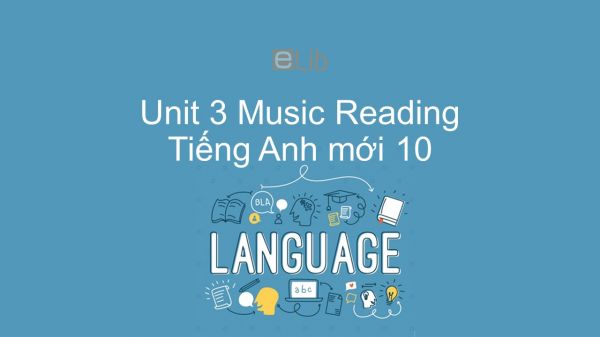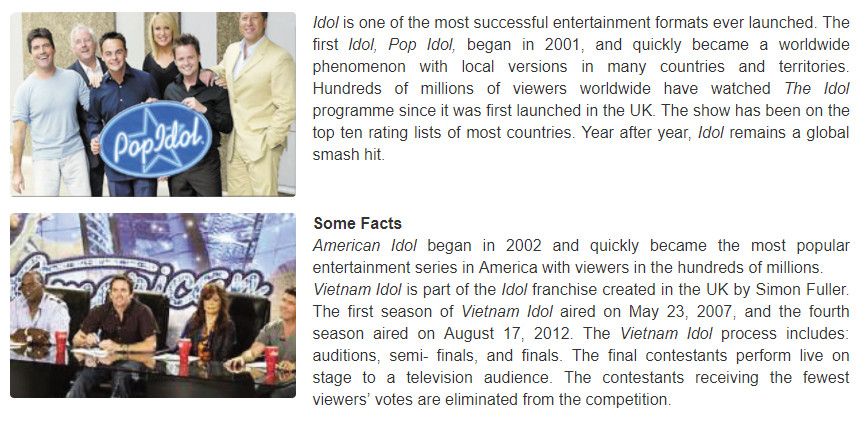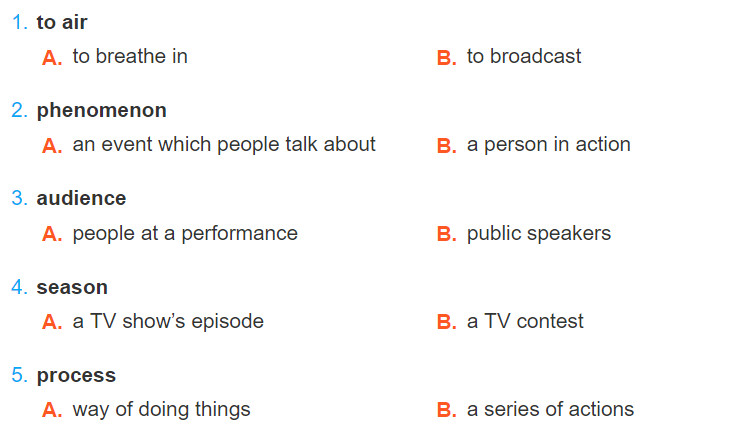Unit 3 lớp 10: Music - Reading
Bài học Unit 3 lớp 10 mới phần Reading hướng dẫn các em xây dựng từ vựng hỏi và trả lời về các chương trình âm nhạc. Thông qua các dạng bài tập khác nhau, các em sẽ hiểu rõ hơn về chủ đề âm nhạc. Mời các em cùng tham khảo!
Mục lục nội dung

Unit 3 lớp 10: Music - Reading
1. Task 1 Unit 3 lớp 10 Reading
Look at the logos. Are you familiar with them? Tell a partner what you know. (Nhìn vào các logo. Bạn có quen chúng không? Kể với bạn bè về những gì bạn biết về chúng.)
Unit 3 lớp 10 Reading
Guide to answer
a. Pop Idol, created by the British entertainment executive Simon Fuller, is a music competition which began on British ITV on October 6, 2001 to select the best new young pop singer in the UK based on viewer voting and participation.
(Pop Idol, người điều hành giải trí Anh quốc, sáng tạo ra bởi Simon Fuller, là một cuộc thi âm nhạc bắt đầu trên ITV của Anh vào ngày 6 tháng 10 năm 2001 để chọn ca sĩ nhạc pop trẻ mới tốt nhất tại Anh dựa trên việc bỏ phiếu và sự tham gia của người xem.)
b. Who Wants to be a Millionaire or informally called Millionaire is an American television quiz show based upon the British programme of the same title, which offers a maximum prize of $ 1,000,000 for correctly answering a series of consecutive multiple choice questions.
(Ai Muốn được một Triệu phú hoặc Triệu phú không chính thức là một chương trình giải trí về truyền hình Mỹ dựa trên chương trình Anh của cùng một tựa đề, đưa ra giải thưởng tối đa 1.000.000 đô la cho việc trả lời một loạt các câu hỏi trắc nghiệm liên tiếp.)
c. Vietnam Idol is part of the Idol franchise of the original reality programme Pop Idol by Simon Fuller. The first season of Vietnam Idol aired on May 23, 2007 on HTV9, and the fourth season aired on August 17, 2012.
(Việt Nam Idol là một phần của chương trình nhượng quyền thần tượng của chương trình Pop Idol đầu tiên của Simon Fuller. Mùa giải đầu tiên của Vietnam Idol phát sóng vào ngày 23 tháng 5 năm 2007 trên HTV9 và mùa thứ tư phát sóng vào ngày 17 tháng 8 năm 2012.)
2. Task 2 Unit 3 lớp 10 Reading
Read the text and discuss the significance of these years: 2001, 2002, 2007, and 2012. (Đọc bài viết và thảo luận những về ý nghĩa của những năm sau: 2001, 2002, 2007 và 2012.)

Tạm dịch
Thần tượng là một trong những hình thức giải trí thành công nhất từ trước đến nay được thực hiện. Chương trình thần tượng đầu tiên, Thần Tượng Nhạc Pop, bắt đầu vào năm 2001, và nhanh chóng trở thành một hiện tượng toàn cầu với các phiên bản của nhiều nước và dân tộc. Hàng triệu người xem toàn thế giới đã xem chương trình Thần tượng kể từ khi nó được lần đầu công chiếu ở Anh. Buổi biểu diễn đã nằm trong danh sách top 10 chương trình được đánh giá yêu thích của hầu hết các nước. Năm này qua năm khác, Thần tượng vẫn là một cơn sốt toàn cầu.
Một vài sự thật
Chương trình Thần tượng Mỹ bắt đầu vào năm 2002 và nhanh chóng trở chương trình giải trí ở Mỹ với lượng người xem lên đến hàng trăm triệu người.
Chương trình Thần tượng Việt Nam là một phần của chương trình Thần tượng được cấp bản quyền tạo ra bởi Simon Fuller. Mùa đầu tiên của Thần tượng Việt Nam lên sóng vào ngày 23 tháng 5 năm 2007, và mùa thứ 4 được lên sóng ngày 17 tháng 8 năm 2012. Chương trình Thần tượng Việt Nam bao gồm: vòng thử giọng, bán kết và chung kết. Những thí sinh lọt vào vòng chung kết trình diễn trực tiếp trên sân khấu cho người xem trên TV. Những thí sinh nhận được ít lượt bình chọn nhất sẽ bị loại khỏi cuộc thi.
Guide to answer
+ 2001: the year that Pop Idol was first launched in the UK
(2001: Năm thần tượng Pop ra mắt đầu tiên ở Anh)
+ 2002: the beginning of American Idol
(2002: Mùa đầu tiên của Thần tượng Mỹ)
+ 2007: the first season of Vietnam Idol
(2007: Mùa đầu tiên của Việt Nam Idol)
+ 2012: the fourth season of Vietnam Idol
(2012: Mùa thứ 4 của Việt Nam Idol)
3. Task 3 Unit 3 lớp 10 Reading
Circle the appropriate meaning for each word from the text. (Khoanh tròn vào nghĩa thích hợp của mỗi từ trong đoạn văn.)

Unit 3 lớp 10 Reading
Tạm dịch
1. lên sóng, phát sóng
2. hiện tượng
3. khán giả, thính giả
4. mùa - phần được chiếu
5. quá trình
Guide to answer
|
1 - b |
2 – a |
3 – a |
4 – a |
5 – b |
4. Task 4 Unit 3 lớp 10 Reading
Ask and answer the following questions. (Trả lời câu hỏi)
Guide to answer
1. What entertainment format is a global smash hit?
(Hình thức giải trí nào là trào lưu phổ biến trên toàn cầu?)
=> The Idol format. (Chương trình thần tượng)
2. Where did the Idol format come from?
(Chương trình Thần tượng xuất phát từ đâu?)
=> It came from the UK. (Nó đến từ Anh.)
3. How long has the Idol format lasted?
(Chương trình Thần tượng diễn ra trong thời gian bao lâu rồi?)
=> 12 years. (12 năm.)
4. Is Vietnam Idol an original programme or a franchised one?
(Thần tượng Âm nhạc Việt Nam là một chương trình gốc hay chương trình được nhượng quyền?)
=> It's a franchised programme. (Đó là chương trình được nhượng quyền)
5. What do you think of the Vietnam Idol shows?
(Bạn nghĩ gì về chương trình Thần tượng Âm nhạc Việt Nam?)
=> I think this is an interesting programme because it helps me relaxed after hours studying.
(Tôi nghĩ đây là một chương trình thú vị bởi vì nó giúp tôi giải trí sau những giờ học.)
5. Practice Task 1
Read the passage below and decide whether the statements are TRUE or FALSE?
Check out these sure signs of true music lovers. See how many of them you can relate to, and find out just how big of a music fan you actually are.
1. You Really Did Like that Band Before They Were Famous
A lot of people make this claim, but not everyone can back it up. You, on the other hand, have a copy of a CD the band actually burned themselves complete with hand-drawn art. You own a limited-edition T-shirt they sold when they were still playing dive bars in no-name towns. In fact, the drummer even crashed on your coach one night after he partied too hard, and the rest of the band left without him. You saw the group’s rise to fame coming, and no one can question that.
2. It’s Impossible to Answer the Question “What’s Your Favorite Album?”
Top five lists are one thing, but when people ask you to pick just one album as your all-time favorite … that’s ridiculous. With so much good music out there, it would be a disservice to the diverse history of music to decide on only one. That’s like asking a mother to choose her favorite child. You love them all for different reasons.
3. You Always Have Recommendations for Friends and Family
Being a huge music fan means you not only understand what you like, you also have an intuitive sense of what others will enjoy. It doesn’t matter if it’s your grandma, your college roommate, or your boss, you can introduce anyone to something fresh and exciting that will expand their appreciation of music. Everybody needs at least one friend like that.
4. Your Music Collection is Meticulously Organized
Big-time music fans can get a bit obsessive about cataloguing their music collections. Whether it’s physical albums or digital tracks, you’ve got a system that can’t be messed with. Maybe you organize it by genre and then alphabetize by band name. Perhaps you’ve created a hierarchy based on Billboard chart performance or a timeline following the year each album was released. You most likely own a massive external hard drive containing subfolders within subfolders filled with mp3s. Some may call you crazy, but when you love something, you take good care of it.
Question 1: There are 4 main signs to see if one person is a big music fan.
A. True B. False
Question 2: If you like a music band a lot, you can pick out your most favourite song.
A. True B. False
Question 3: Being a music fan enables you to recommend music for others.
A. True B. False
Question 4: Music fan love organizing their playlist.
A. True B. False
Question 5: Music fans only organize songs by genres.
A. True B. False
6. Practice Task 2
Choose the letter A, B, C or D to complete the passage below
A composer is someone who ________ (6) and directs original music used to produce various types of media entertainment. The scores written need ________ (7) technically correct in order to create flawless performances by choruses, musicians or instrumental ensembles. Sound recordings produced from the score vary ________ (8) style and may reflect the classical, country, folk, jazz, techno or pop genres. A composer's job is to help ________ (9) a story in a film, television story, play or video game without ________ (10) the viewer. The soundtrack they create must suit the project ________ (11) convey the appropriate mood and tone.
Successful composers are versatile with ________ (12) collaboration skills, allowing them ________ (13) on a variety of projects with producers and musicians from various backgrounds. They have extensive knowledge of the industry and a passion and talent ________ (14) creating sound recordings. Most composers are often skilled in playing one or multiple instruments and ________ (15) a good ear for music.
Question 6: A. write B. wrote C. writes D. writing
Question 7: A. to be B. be C. being D. is
Question 8: A. of B. on C. at D. in
Question 9: A. tell B. say C. speak D. talk
Question 10: A. distract B. distracted C. distracts D. distracting
Question 11: A. but B. or C. because D. an
Question 12: A. effective B. effect C. effects D. effectively
Question 13: A. work B. working C. worked D. to work
Question 14: A. in B. for C. with D. on
Question 15: A. get B. come C. have D. make
Để rèn luyện kĩ năng đọc và hiểu chi tiết về chủ đề "Music", mời các em đến với phần trắc nghiệm Unit 3 Reading Tiếng Anh 10 mới sau đây và cùng luyện tập.
8. Conclusion
Qua bài học này các em cần ghi nhớ các từ vựng sau:
- viewer /ˈvjuːə(r)/ người xem
- participation /pɑːˌtɪsɪˈpeɪʃn/ sự tham gia
- consecutive /kənˈsekjətɪv/ liên tiếp
- maximum /ˈmæksɪməm/ tối đa
- launch /lɔːntʃ/ ra mắt
- air (v) /eə(r)/ phát sóng
- phenomenon /fəˈnɒmɪnən/ hiện tượng
- audience /ˈɔːdiəns/ khán giả
- episode /ˈepɪsəʊd/ tập
Tham khảo thêm
- doc Unit 3 lớp 10: Music - Getting Started
- doc Unit 3 lớp 10: Music - Language
- doc Unit 3 lớp 10: Music - Speaking
- doc Unit 3 lớp 10: Music - Listening
- doc Unit 3 lớp 10: Music - Writing
- doc Unit 3 lớp 10: Music - Communication and Culture
- doc Unit 3 lớp 10: Music - Looking Back
- doc Unit 3 lớp 10: Music - Project




